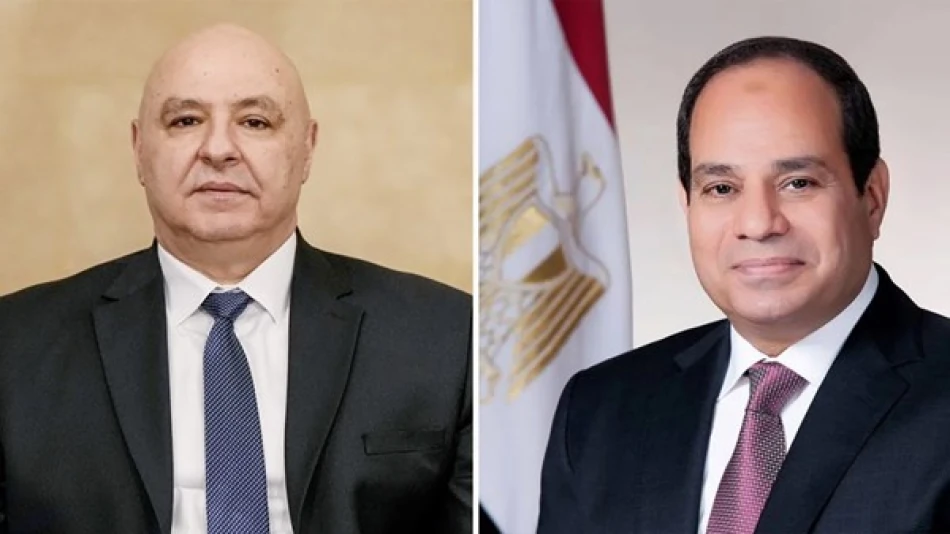
Egyptian and Lebanese Leaders Discuss Strengthening Bilateral Ties in Phone Call
Egypt and Lebanon Strengthen Ties Amid Regional Turbulence as Gaza Crisis Deepens
Egyptian President Abdel Fattah al-Sisi and newly elected Lebanese President Joseph Aoun held their first official phone call on Monday, signaling a potential reset in bilateral relations as both nations navigate mounting regional pressures from the ongoing Gaza conflict and broader Middle Eastern instability. The conversation underscored Egypt's strategic pivot toward supporting Lebanon's reconstruction efforts while maintaining its role as a key mediator in Palestinian affairs.
Economic Partnership Takes Center Stage
The leaders prioritized economic cooperation, with both presidents emphasizing the need to expand bilateral trade and investment opportunities. This focus reflects Lebanon's desperate need for economic lifelines as the country continues to grapple with one of the world's worst financial crises since the 1850s.
Egypt's positioning as a potential economic partner comes at a critical juncture for Lebanon, which has seen its GDP shrink by over 40% since 2019. Egyptian investments could provide much-needed capital for Lebanon's struggling infrastructure and energy sectors, particularly as traditional Gulf investors remain cautious about Lebanese exposure.
Strategic Timing of Renewed Cooperation
The timing of this diplomatic outreach is significant. Aoun's recent election as Lebanon's president ended a two-year presidential vacuum, creating new opportunities for regional partnerships. Egypt appears eager to capitalize on this political stability by positioning itself as a reliable partner for Lebanon's recovery.
For Egypt, deeper Lebanese ties serve multiple strategic purposes: expanding its regional influence, creating new export markets for Egyptian goods, and potentially securing energy cooperation agreements as both countries develop their Mediterranean gas resources.
Regional Security Concerns Drive Diplomatic Agenda
Beyond economic cooperation, the call addressed pressing regional security issues, with both leaders emphasizing the need for de-escalation across the Middle East. Sisi reaffirmed Egypt's unwavering support for Lebanese sovereignty and territorial integrity, a message that carries particular weight given ongoing tensions along Lebanon's southern border.
Egypt's commitment to supporting Lebanon's reconstruction efforts represents a broader strategy of stabilizing the Levant region. As Lebanon faces ongoing challenges from displaced populations and infrastructure damage, Egyptian expertise in large-scale construction projects could prove valuable.
Gaza Crisis Dominates Regional Calculations
The leaders spent considerable time discussing the deteriorating situation in Gaza, calling for an immediate ceasefire and increased humanitarian aid access. Both presidents reiterated their support for Palestinian statehood and rejected any forced displacement of Palestinians from their territories.
This unified stance reflects broader Arab consensus on Palestinian issues, but also highlights Egypt's continued role as a crucial mediator in Gaza affairs. Egypt's control of the Rafah crossing and its historical ties to Palestinian factions make its position particularly influential in any future ceasefire negotiations.
Implications for Regional Stability
The Egypt-Lebanon alignment on Gaza issues could strengthen Arab diplomatic efforts to pressure for conflict resolution. As two of the region's most historically significant Arab states, their coordinated approach may influence broader regional responses to the crisis.
The emphasis on preventing Palestinian displacement also reflects both countries' concerns about regional demographic changes that could affect their own stability and security calculations.
Looking Ahead: Challenges and Opportunities
While the diplomatic rhetoric suggests renewed cooperation, significant challenges remain. Lebanon's ongoing economic crisis limits its capacity for major bilateral projects, while Egypt faces its own fiscal constraints that may limit large-scale aid or investment commitments.
However, the call represents an important first step in rebuilding regional partnerships that have been strained by years of political instability. Success in Egypt-Lebanon cooperation could serve as a model for broader Arab regional integration efforts, particularly as traditional power brokers like Saudi Arabia and the UAE pursue more selective regional engagement strategies.
The focus on reconstruction assistance also positions both countries to potentially benefit from future international aid packages, as donor nations often prefer working through established regional partnerships rather than direct bilateral arrangements.
Most Viewed News

 Layla Al Mansoori
Layla Al Mansoori






